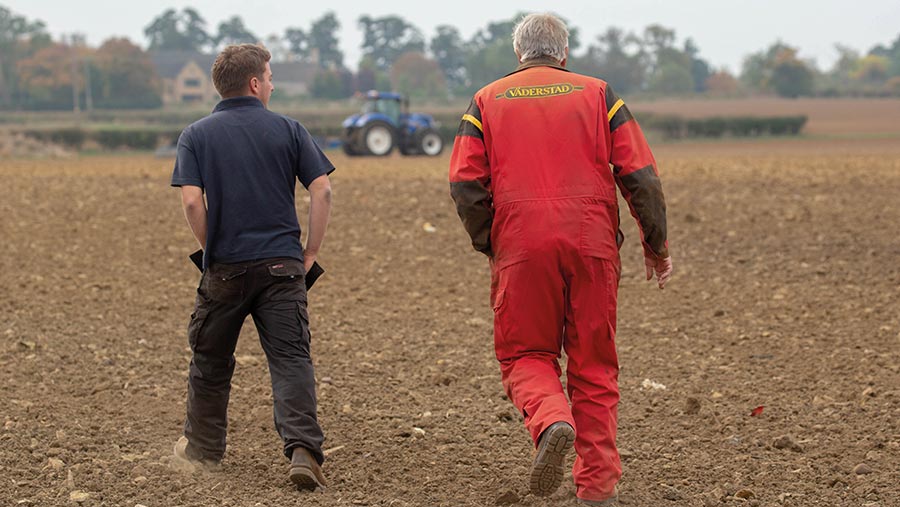Why poor succession planning can impact mental health
 © Tim Scrivener
© Tim Scrivener Numerous aspects of farming can negatively impact upon mental health, but the one many might not have drawn a line to is the eternal pressures surrounding succession.
Though succession is an issue that is addressed more now than it was previously, there’s still a lot of work to do, says Siân Bushell, facilitator at staffing consultants Siân Bushell Associates.
“I think it’s so personal and some families are afraid to talk about it, as it could create arguments,” she says. “But it can affect the whole family – even grandchildren.”
See also: Find our succession planning articles all in one place
An important part of succession planning is likely to involve setting out clearly the current business owners’ intentions in their will, explains Elizabeth Ashford, mediator at Monmouthshire Mediation Practice.
“Many families find discussing future plans difficult as there may be differences of opinion as to the best way forward, problems in deciding the fairest way of dividing up assets and/or a reluctance to contemplate life beyond the days of a key figure,” she says.
“In addition, it’s often hard to separate the business from the emotional connections.
“The detrimental effect that this sort of dispute has on relationships and the mental health and wellbeing of all concerned can be devastating.”
Mental health issues
Mrs Bushell has come across a lot of mental health issues among the younger generation, who become frustrated and feel insecure due to not being paid properly or having a secure future in the business.
“Sometimes it’s middle-aged farmers who feel trapped because they have put so much into the business, they are reluctant to walk away,” she explains.
“The sad thing is that most people think they are uniquely stuck in these situations, but they are probably the majority.”
Action points to counter mental health and succession challenges
- Speak to others – whether it’s peers who have experienced similar situations, friends, relatives or even the bank manager or accountant
- Have conversations with the family – choose a neutral venue, allow everyone a chance to speak, involve an independent facilitator
- Join discussion groups – these let people know they aren’t the only ones struggling
- Take a mental first-aid course – an affordable tool that helps people recognise issues in others and themselves, giving them confidence to know what actions to take
- Take time off – decision making improves and people become more effective from taking a break
- Take up hobbies, interests, volunteering or diversify – these provide something to look forward to in retirement, create mental stimulation and could even produce another income
A recent survey of 15,000 farmers by the Royal Agricultural Benevolent Institution (Rabi) and the University of Exeter found that one-third of farmers could be suffering with depression – highlighting how prevalent mental health and wellbeing issues are in the sector.
“It’s important to be honest and open if you are suffering,” says Mrs Bushell. “Unfortunately, some still look on it as a weakness, but thankfully it’s being talked about a lot more now.”
Mediation
But whatever situation families are in, involving a mediator can help all parties considering the best approach to succession.
It’s voluntary, so everyone needs to agree to participate, says Mrs Ashford.
“A mediator will take time to speak confidentially with each of the parties to fully appreciate their respective positions and the sensitivities involved.
“The cost is likely to be borne by the estate and would be less than taking the matter to court.”
And once a succession plan has been established, the interim period between the two generations can be tremendously dynamic for a business, says Mrs Bushell.
“Combining the experience of the older generation with the passion of the younger can be very productive.
“Succession is an ongoing, living plan. Just take small steps as you don’t have to sort the whole thing next week. Be aware of the end goal and take it easy.”
Charities that can help with mental health issues
- Farming Community Network – personal or business-related support helpline for farmers and farming families
- Yana – a rural mental health helpline for farmers and rural businesses
- DPJ Foundation – a Welsh charity to help those suffering with their mental health in agriculture
- Rabi – a national charity providing support for farming communities in England and Wales
- Farm Safety Foundation/Yellow Wellies – a charity dedicated to supporting the physical and mental wellbeing of UK farmers
- Addington Fund – a farming and rural charity providing disaster relief and retirement housing
- RSABI – emotional, practical and financial support for Scotland’s agricultural families
- Mind – a mental health charity providing support for anyone who needs it
